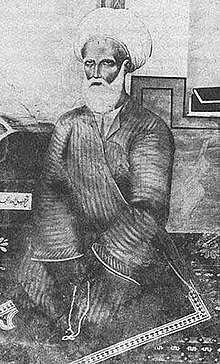Ahmad al-Ahsa'i | |
|---|---|
الشيخ أحمد الإحسائي | |
 Ahmad bin Zayn al-Din al-Ahsáʼí | |
| Personal | |
| Born | May 1753 |
| Died | 27 June 1826 (aged 72–73) |
| Resting place | Jannaṫ al-Baqīʻ Cemetery, Medina, Hijaz (Present-day Saudi Arabia) |
| Religion | Islam |
| Era | Qajar dynasty |
| Denomination | Twelver Shia |
| Movement | Shaykhísm |
| Muslim leader | |
Shaykh Ahmad bin Zayn al-Dín bin Ibráhím al-Ahsá'í (Arabic: شيخ أحمد بن زين الدين بن إبراهيم الأحسائي) (May 1753–27 June 1826), commonly known as Shaykh Ahmad or al-Ahsá'í, was a prominent Shia Muslim theologian and jurist who founded the influential Shaykhí school of Twelver Shiism, which attracted followers from throughout the Persian and Ottoman Empires.
He was a native of the Al-Ahsa region (Eastern Arabian Peninsula), educated in Bahrain and the theological centres of Najaf and Karbala in Iraq.[1] Spending the last twenty years of his life in Iran, he received the protection and patronage of princes of the Qajar dynasty.[2] His ancestors were nomadic Sunnis.[3]
Shaykh Ahmad diverged from the Usuli school on key issues related to eschatology, the role of the ulama, and the proper interpretation of the mystical hadith of the Twelve Imams. These divergences, according to Bahá'í scholar Peter Smith, resulted in accusations of heresy from orthodox members of the Shia ulama, and instances of persecution against Ahsá'í and his followers occurred during and after his lifetime. His teachings were complex, thus he often practised Taqayya concealing his controversial ideas from his opponents.[4]
Today, Shaykhí populations retain a minority following in Iran and Iraq. After the death of Shaykh Ahmad's successor, Kazim Rashti, many Shaykhís converted to Bábism and the Baháʼí faith; the two Shaykhí leaders continue to be highly regarded by the Babis and the Baháʼís, being seen as spiritual forerunners to their religions.
- ^ Zarandi 1932, p. 2.
- ^ Zarandi 1932, p. 7.
- ^ "AḤSĀʾĪ, SHAIKH AḤMAD – Encyclopaedia Iranica". iranicaonline.org. Retrieved 2020-09-20.
- ^ Smith, Peter (1999). A Concise Encyclopedia of the Baháʼí Faith. Oxford, UK: Oneworld Publications. p. 31. ISBN 1-85168-184-1.